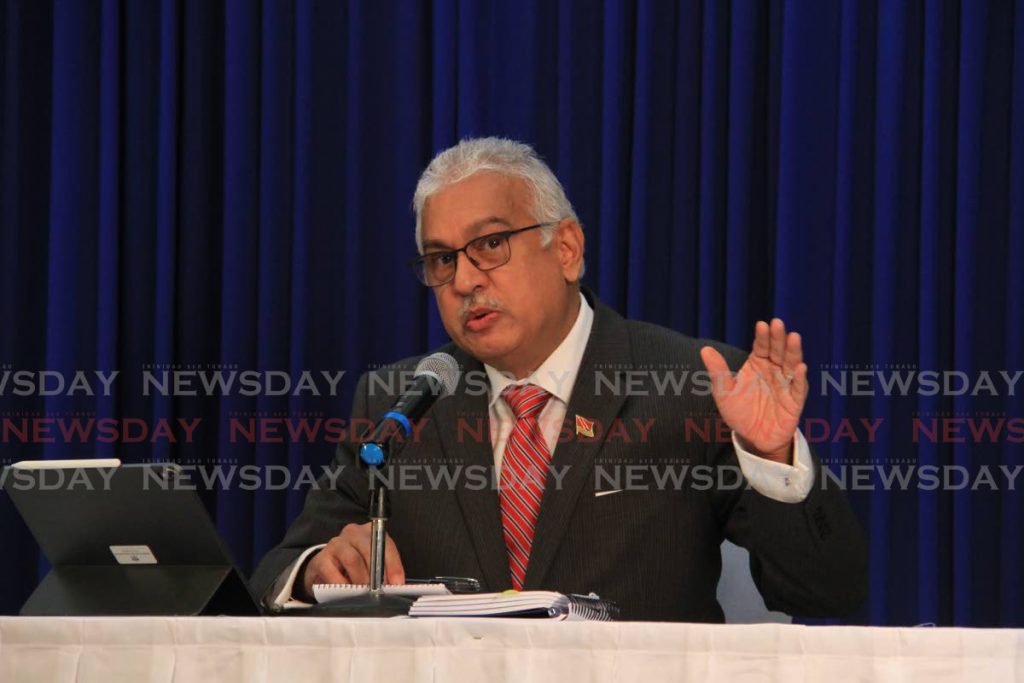[UPDATED] PCR test, 7 days quarantine even after vaccine for visitors

Health Minister Terrence Deyalsingh said the ministry has reached out to regional and international bodies and “based on current evidence” anyone coming into the country must take a PCR test regardless of their covid19 immunisation status.
They will also still have to be quarantined for seven days after entering TT.
Speaking at the covid19 virtual press conference on Saturday, he said TT already had a draft certificate of immunisation, which was submitted to and agreed on by PAHO (Pan American Health Organization).
“It is a separate vaccination record for covid19. The importance of that, because we don’t know as yet, is that, will countries be requiring what is called an immunisation passport to allow you to enter their countries? This will be your immunisation passport. It has to be fool-proof and that is what we are working in right now but we have a draft of it.”
At the moment, there is no policy that people would have to be vaccinated to enter TT.
Deyalsingh noted that the World Health Organization (WHO) recently announced that the Covax facility, under which TT would get an initial shipment to cover 20 per cent of the population, signed four deals with vaccine manufacturers.
WHO signed an advance purchase agreement with AstraZeneca for 170 million doses of the AstraZeneca/Oxford covid19 vaccine candidate, a memorandum of understanding with Johnson and Johnson for 500 million doses of the Janssen vaccine, an agreement with the Serum Institute of India (SII) for 200 million doses with options for up to 900 million more doses of the AstraZeneca/Oxford or Novavax vaccines, and a statement of intent for 200 million doses of the Sanofi/GSK vaccine.
In addition to this, Covax is pursuing other research and development initiatives through partnership agreements which would potentially allow access to more than one billion vaccine doses.
The hope is that the various agreements would mean vaccines would be available to those under the facility by the first half of 2021.
However, an article in the UK Guardian expressed concern about Covax’s ability to provide vaccines on time, saying its failure could leave some poorer countries without access to vaccines until 2024.
It said a financial risk assessment stated that Covax needed US$4.9 billion more to vaccinate 20 per cent of people in poorer countries by 2021. Also, it said SII decided that it would prioritise supplying India first.
“The cheaper and easier to transport vaccines that the scheme has banked on, including the Oxford University-AstraZeneca vaccine, have been slower in testing and getting regulatory approval.”
While the article said the Pfizer/BioNTech and Moderna vaccines were not under Covax, the WHO website specifically named Moderna as one of the ten vaccines in which the facility invested.
In preparation for the best case scenario, Deyalsingh said TT already had three sub-zero freezers, which can be used immediately if a covid19 vaccine was to be approved by WHO.
He said the ministry was ordering more sub-zero freezers and tenders would close on Tuesday. He also expected to issue purchase orders before Christmas with the freezers being delivered in four weeks from then. The new freezers would be placed at Couva Hospital, C40 in Chaguaramas, and in Tobago.
In addition, Deyalsingh said chillers, the rooms in which freezers would be placed, in various health facilities were already in good condition but one needed to be built at the Couva health facility.
He hoped the country would be in a position to receive store, and distribute vaccines a month ahead of the anticipated receipt of vaccines in March 2021.
The ministry also started “fleshing out” distribution or satellite centres which would have to be able to store and administer vaccines as well as have “resuscitation capacity” in case someone had an adverse reaction to the vaccine.
He said there would be five in the Eastern RHA and others in the North West, North Central, South West, and Tobago RHAs.
This story was originally published with the title "Ministry orders more sub-zero freezers to store covid19 vaccines" and has been adjusted to include additional details. See original post below.
Health Minister Terrence Deyalsingh said Trinidad and Tobago already has three sub-zero freezers, which can be used immediately to store covid19 vaccines once one is approved by the World Health Organization.
He said the ministry was ordering more sub-zero freezers and tenders for the equipment would close on Tuesday. Deyalsingh said he expects to issue purchase orders before Christmas and anticipates the new freezers will be delivered in four weeks.
The minister was giving an update at Saturday's virtual press briefing on measures taken to prevent the spread of covid19 and steps to protect the population.
Deyalsingh said chillers, the rooms in which freezers would be placed, in various health facilities were already in good condition but one had to be built at the Couva health facility.
“I am happy to report that a board note to the North Central RHA, which will be the procurement agency for that facility, they went out to tender and interested persons have already received their packages to build out the two to eight degree chillers at Couva.”
He hoped the country would be in a position to receive, store, and distribute vaccines a month before the region anticipated receiving approved vaccines in March 2021.


Comments
"[UPDATED] PCR test, 7 days quarantine even after vaccine for visitors"